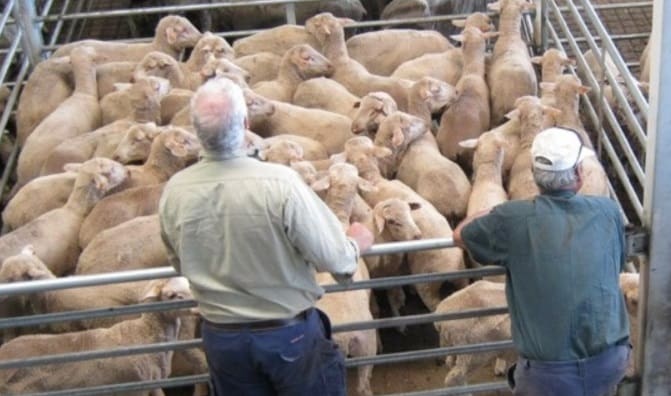Latest listings on Jobs Central:
- Station hand, Woolnorth, TAS – TRT Pastoral Group
- Manager, Woolnorth TAS – TRT Pastoral Group
- Program manager, SustainaWOOL Integrity Scheme – AWEX
- General manager, research commercialisation – via Agricultural Appointments
- Territory sales manager, specialty products – via Agricultural Appointments
- Saleyards Superintendent – Southern Downs Regional Council
- Various Meat processing opportunities – Thomas Foods International
- Cattle station opportunities – Australian Country Choice
- Livestock transport driver – JBS
- Assistant feedlot manager, WA – via Agricultural Appointments
- Assistant feedlot manager, VIC – via Agricultural Appointments
- Drover – Australian Food Group
- Meat Process Consultant – Marel
- Saleyards Coordinator, Charters Towers
- Feedmill hands, Koojan Downs – Harvest Road
- Property Manager, Central QLF aggregation – TVF Pastoral
- Head stockperson, Durrie QLD – Hancock Agriculture
- Aboriginal Pastoral Academy Coordinator – KPCA
- Sales Manager, Sydney – Midfield Group
Click here to access these and other exciting meat and livestock supply chain jobs currently listed on Jobs Central.

EMPLOYERS prefer to receive feedback from current employees so they can address the situation and make changes before they decide to leave.
However, this frequently doesn’t happen. Many employees fear repercussions and therefore don’t share their concerns with management while they are still employed. They start looking elsewhere and managers only realise there’s an issue when they put in their notice.
In this situation, exit interviews are the employer’s only option. But on a positive note, exit interviews can be an extremely effective way to obtain open, honest feedback.
Employers conduct exit interviews to gain information that can be used to make necessary improvements to enhance company image, aid retention and recruitment. Reputation means a great deal to candidates and can be extremely important for candidates when they are selecting which jobs to apply for.
The valuable feedback gained from exit interviews can allow companies, large and small, along the beef supply chain to make changes to enhance their brand.
Conducting the exit interview
Exit interviews are given to employees that have given their notice, but have not yet left the business. To obtain the most candid responses from employees that are leaving, someone other than their immediate supervisor should conduct the interview. In larger agribusiness companies, this person might be in human resources, or an overseer or more senior work colleague in smaller ones. In a smaller cattle business it might be a manager;’s wife or partner, or a leading hand.
They are called ‘interviews’ because they are most likely conducted verbally, and in-person; however they can also be conducted via written or online surveys. Some businesses do both. This is especially useful if there are some questions you feel employees might be hesitant to answer face-to-face, but would be more comfortable replying to in a written situation (such as questions relating to their boss or supervisor).
Many templates and question suggestions for exit interviews can be found online.
Sample exit interview questions
Here’s some sample interview questions to help get you started. Others will flow naturally based on the discussion:
- Why are you leaving?
- Did anything in particular impact your decision to leave?
- Did you address these concerns with a supervisor/manager prior to your decision to leave?
- How was your relationship with your supervisor?
- What did you like most about your position?
- What did you like least about your position?
- What would you have liked to change about your position with our company?
- Were your job duties and responsibilities what you expected?
- Did you find anything to be frustrating about the company?
- What are the most positive aspects of the organisation?
- What are the main reasons you decided to accept your new position outside of our company?
- What can our business do to retain talented employees?
- Would you recommend our company to family and friends?
- Were you satisfied with the benefits package our company offered to you?
Always end the interview with an open-ended question to allow the employee to comment on anything else that is on their mind, such as “Is there anything else you would like to share with us?”
Thank the employee for their time and service to the company. Let them know how their feedback will be used – hopefully to evaluate employee satisfaction and make necessary changes to improve the business. If the employee feels their concerns were heard, they may be more likely to spread positive word-of-mouth regarding the company.
Keep in mind that exit interviews should be given to all employees that are leaving on their own accord. Even if you assume an employee’s departure has nothing to do with the company (such as their spouse accepting a position in another part of the country), they still will have valuable feedback on the position and your business.
Some of the most honest and priceless feedback comes from employees that are leaving the organisation. Although it is typically too late to save that employee, they can provide helpful information for you to consider improving the work environment for others.
Exit interviews can gather valuable insight into what employees were dissatisfied about during their tenure at your organization, and they are usually willing to be more forthcoming with information.
Source: www.agcareers.com

HAVE YOUR SAY